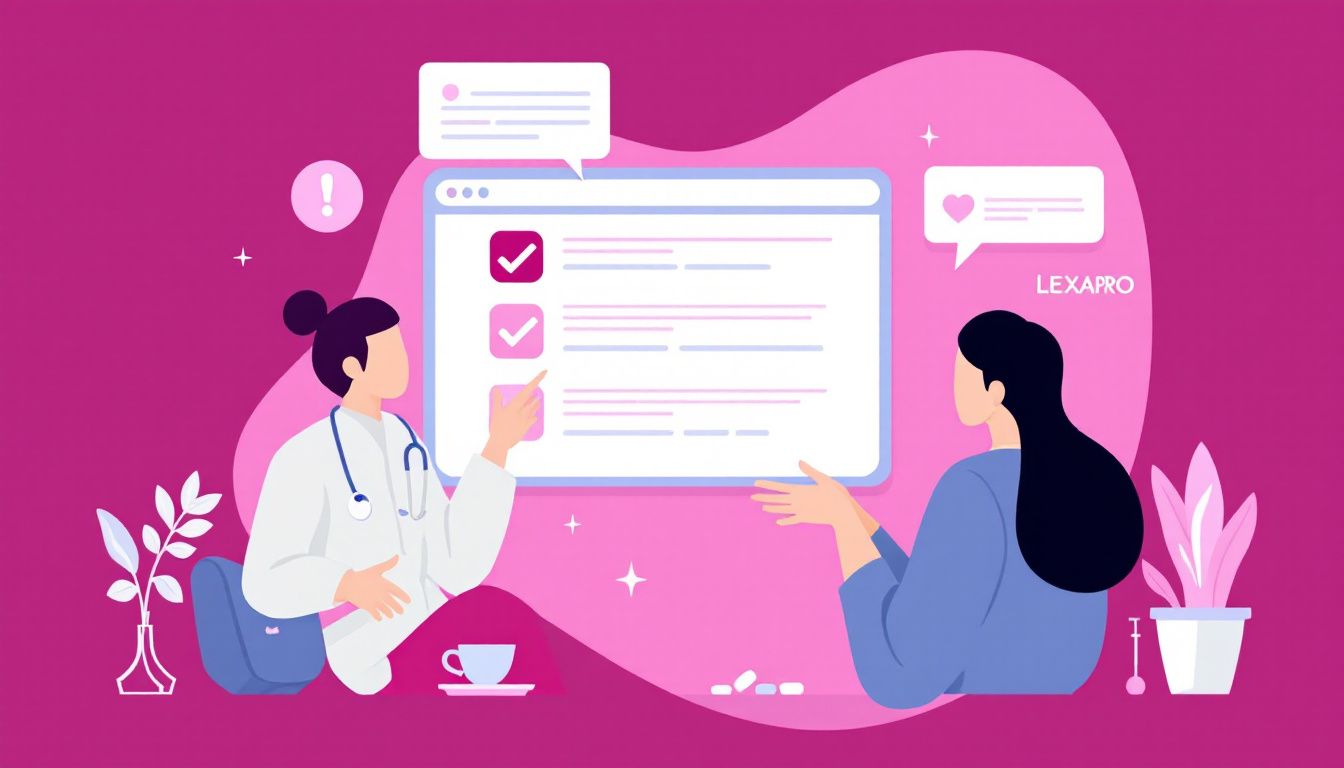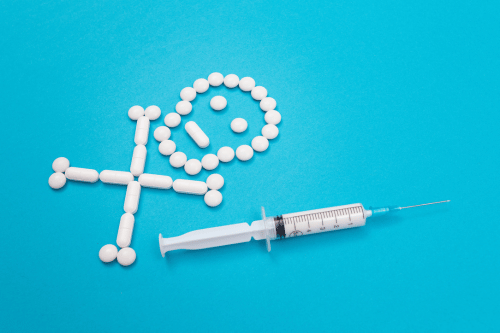Can You OD on Lexapro? Risks, Symptoms, and What to Do
Yes, you can overdose on Lexapro. This can happen by taking too much intentionally or accidentally. In this article, we discuss the health risks, symptoms of an overdose, and what urgent actions to take if it occurs. Can you OD on Lexapro? It’s important to be aware of the potential dangers.
Key Takeaways
Lexapro (escitalopram) is an SSRI effective in treating various mental health disorders, with proper adherence to prescribed dosages being crucial for safety.
Overdosing on Lexapro can lead to serious health risks, including serotonin syndrome and cardiac issues, necessitating immediate medical intervention.
Preventative measures, such as medication management tools and regular healthcare check-ups, are essential for minimizing the risk of a Lexapro overdose.
Understanding Lexapro (Escitalopram)
Lexapro is the brand name for escitalopram. It is classified as a selective serotonin reuptake inhibitor (SSRI). These selective serotonin reuptake inhibitors are widely recognized for their effectiveness in treating depression and anxiety disorders. Lexapro specifically targets serotonin levels in the brain, a neurotransmitter crucial for mood regulation. Lexapro helps alleviate symptoms of depression and anxiety by increasing serotonin availability, providing relief for many individuals.
The conditions treated by Lexapro are diverse, ranging from major depressive disorder to generalized anxiety disorder (GAD), panic disorder, and obsessive-compulsive disorder (OCD). These mental health conditions can significantly impact an individual’s quality of life, making it essential to manage them effectively. Lexapro’s role in enhancing serotonin levels makes it a powerful tool in the arsenal against these disorders.
Following your healthcare provider’s prescription ensures Lexapro’s effectiveness and safety. Like other SSRIs, Lexapro is typically part of a comprehensive treatment plan that may include therapy and lifestyle changes. Knowing how Lexapro works and its intended use is the initial step to its safe and beneficial use.
Can You Overdose on Lexapro?

Overdosing on Lexapro, though relatively rare, is a serious possibility. An overdose can happen if a person takes more than the prescribed amount of Lexapro. It can also occur if Lexapro is mixed with other substances, such as alcohol or other medications. This can be due to accidental double dosing, forgetfulness, or even suicidal intent. Understanding the significant risks associated with an overdose is key to prevention.
The factors contributing to a Lexapro overdose are varied. For instance, taking Lexapro beyond the prescribed dosage can lead to severe and potentially life-threatening consequences. Using medication management tools such as pill boxes can help prevent accidental overdoses by ensuring the correct dosage is taken consistently.
Following your healthcare provider’s instructions meticulously and avoiding combinations with other substances without professional guidance minimize overdose risks. By being vigilant and informed, you can significantly reduce the risk of a potential Lexapro overdose.
Lexapro Overdose Symptoms
Timely intervention depends on recognizing Lexapro overdose symptoms. Common symptoms consist of dizziness, confusion, and a rapid heartbeat. Other symptoms may include nausea, vomiting, changes in blood pressure, and loss of consciousness. The severity of these symptoms can vary depending on the individual’s medical history and the amount of Lexapro ingested.
One particularly severe condition associated with Lexapro overdose is serotonin syndrome. This life-threatening state is caused by elevated serotonin levels and can manifest through symptoms such as agitation, confusion, rapid heart rate, and loss of coordination. Serotonin syndrome requires immediate medical attention as it can quickly escalate to more critical health issues. Additionally, an ssri overdose can also lead to serious complications.
Awareness of these symptoms and their severity is crucial for managing an overdose. Early recognition and prompt action ensure the safety and well-being of those taking Lexapro.
Serious Risks Associated with Lexapro Overdose

Lexapro overdose risks extend beyond immediate symptoms. One of the most serious is serotonin syndrome, especially when combined with medications like MAOIs. This condition can lead to hyperthermia, muscle rigidity, and altered mental status, making it a potentially life threatening condition.
Cardiac issues are also a significant concern in cases of Lexapro overdose. Patients may experience palpitations, syncope, or even QT interval prolongation, which increases the risk of life-threatening cardiac arrhythmias. These symptoms necessitate immediate medical intervention to prevent severe health outcomes.
In addition to serotonin syndrome and cardiac issues, severe overdoses can lead to acute renal failure and other critical health problems. Given the range of serious risks, understanding the potential consequences of a Lexapro overdose underscores the importance of using this medication responsibly and under close medical supervision.
Immediate Steps to Take if Overdose is Suspected
If a Lexapro overdose is suspected, immediate action is essential. The first and most critical step is to call emergency services. Providing healthcare professionals with accurate information about the overdose, including any other substances that may have been ingested, is crucial for effective treatment.
Prompt medical attention can greatly enhance the outcomes of a Lexapro overdose. Seeking help as soon as possible is necessary. Healthcare professionals are equipped to provide the necessary care and support, including monitoring vital signs and managing symptoms. Immediate medical intervention can prevent worsening conditions and reduce severe complications.
In an emergency, every second counts. Acting quickly and decisively by calling emergency services and seeking professional help can make a life-saving difference when dealing with a potential Lexapro overdose.
Medical Intervention for Lexapro Overdose
Managing a Lexapro overdose requires medical intervention. One of the first steps is to inform medical professionals about any other medications or substances consumed alongside Lexapro. Close monitoring of vital signs, such as blood pressure and heart rate, is essential to ensure the patient’s stability.
In cases where the overdose is identified shortly after ingestion, activated charcoal may be administered to limit drug absorption. Additional interventions may include intravenous fluids and medications to manage specific symptoms. Hospitalization is often necessary to provide continuous monitoring and stabilization.
Post-overdose, a comprehensive medical evaluation assesses physical health impacts and determines the appropriate course of action. This thorough approach ensures that all aspects of the patient’s health are addressed, facilitating a safer recovery process.
Recovery and Long-term Management After an Overdose
Recovering from a Lexapro overdose involves more than just immediate medical intervention. Assessing co-occurring conditions and underlying issues is crucial. Counseling and therapy are recommended to address the factors that contributed to the overdose.
Ongoing medical support and mental health interventions are critical components of the recovery process. Mental health specialists often collaborate with healthcare professionals to ensure a holistic approach to recovery. This integrated treatment approach, which addresses both mental health and any substance use disorders, yields better outcomes.
Regular follow-up appointments and monitoring for withdrawal symptoms ensure recovery progress. Engaging support systems, including friends and family, plays a vital role in the recovery process. By providing a supportive environment and continuous care, the chances of a successful recovery are significantly improved.
Preventing Lexapro Overdose

Preventing a Lexapro overdose starts with informed and responsible medication use. Informing healthcare providers about any history of bipolar disorder or substance use disorders before starting Lexapro is essential. This awareness helps healthcare providers tailor treatment plans to minimize risks.
Using medication management tools like pill boxes and organizers can help prevent accidental overdoses. Regular check-ups with a healthcare provider help monitor treatment progress and manage dosage effectively. Being mindful of potential interactions with other substances, including over-the-counter medications, is critical in preventing overdose.
Storing Lexapro securely and out of reach of children is another important preventive measure. By taking these steps and maintaining open communication with healthcare providers, patients can significantly reduce the risk of a Lexapro overdose.
Safe Use of Lexapro
Safe use of Lexapro involves following key practices. Taking Lexapro as prescribed, without altering the dosage or combining it with alcohol, ensures safe and effective use. Consistently taking Lexapro at the same time each day helps maintain stable drug levels in the body.
If a dose is missed, it should be taken as soon as possible unless it’s close to the time for the next prescribed dose. Abruptly stopping Lexapro can lead to withdrawal symptoms, so any changes in dosage should be discussed with a healthcare provider. Using medication reminder systems, such as alarms or apps, can help ensure doses are not missed.
Communicating with healthcare providers about any side effects or health changes is essential for safe medication management. By adhering to these practices, patients can ensure the safe and effective use of Lexapro.
Potential Drug Interactions with Lexapro
Understanding potential drug interactions with Lexapro is vital for preventing adverse effects. Combining Lexapro with specific drugs, such as monoamine oxidase inhibitors (MAOIs) or other antidepressants, raises the risk of serotonin syndrome. This combination significantly increases the risk of overdose and serious side effects.
Limiting or avoiding alcohol while taking Lexapro helps decrease the likelihood of adverse effects and overdose. Combining Lexapro with other substances increases the likelihood of overdose and is dangerous.
Being aware of these potential interactions and communicating with healthcare providers about all medications and supplements being taken can prevent serious health risks and ensure safe Lexapro usage.
Importance of Mental Health Support

Mental health support is vital for effective Lexapro use. Patients should be aware of the potential for suicide risk, especially in those under 25, and monitor mood changes closely. Misusing antidepressants for long periods can lead to physical dependence, affecting both physical and mental health.
Antidepressant abuse can have far-reaching effects on relationships, finances, and jobs. Therefore, seeking help for signs of antidepressant abuse, including detox under 24-hour care and supervision, is essential.
Healthcare providers and mental health professionals play a vital role in providing support and therapy sessions to manage various mental health disorders. By addressing underlying mental health concerns and ensuring continuous support, patients can achieve better outcomes in their treatment journey.
Summary
In summary, understanding the safe use of Lexapro and recognizing the signs and risks of overdose are crucial for anyone taking this medication. Lexapro can be a powerful tool in treating depression and anxiety disorders, but it must be used responsibly and under the guidance of a healthcare provider. Recognizing overdose symptoms and knowing the steps to take in an emergency can save lives.
Preventing a Lexapro overdose involves informed and responsible medication use, regular check-ups, and open communication with healthcare providers. By following these guidelines and understanding the potential risks, patients can safely benefit from Lexapro’s therapeutic effects.
Ultimately, the importance of mental health support cannot be overstated. Ensuring access to qualified healthcare providers and mental health professionals, as well as engaging support systems, can significantly improve treatment outcomes and overall well-being.
Visit SAMHSA for more information or contact us today.

Frequently Asked Questions
Yes, it is possible to overdose on Lexapro, which can lead to severe and potentially life-threatening symptoms that require immediate medical attention. It is crucial to use this medication as prescribed and to avoid combining it with other substances.
Common symptoms of a Lexapro overdose include dizziness, confusion, rapid heartbeat, nausea, vomiting, changes in blood pressure, and loss of consciousness. Severe instances may result in serotonin syndrome, a potentially life-threatening condition.
If you suspect a Lexapro overdose, it is crucial to call emergency services immediately and provide accurate details about the situation. Prompt medical attention is vital to ensure the individual receives the necessary care.
To prevent a Lexapro overdose, it is crucial to take the medication strictly as prescribed and utilize tools such as pill boxes for management. Additionally, avoid combining Lexapro with other substances without consulting a healthcare professional and attend regular check-ups to ensure safe dosage management.
Lexapro may interact with monoamine oxidase inhibitors (MAOIs) and other antidepressants, raising the risk of serotonin syndrome and severe side effects. It is advisable to limit or avoid alcohol to minimize adverse effects while on this medication.





